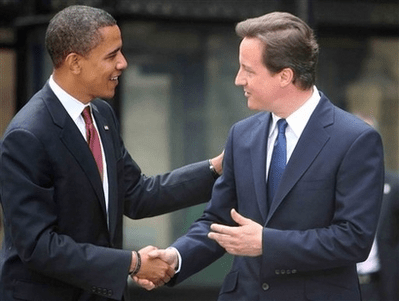 I’ve spent the morning contending with the WSJ’s Heath Robinson-esque
subscription service so you don’t have to. Inside the paper, David Cameron explains what the Special Relationship means to him.
I’ve spent the morning contending with the WSJ’s Heath Robinson-esque
subscription service so you don’t have to. Inside the paper, David Cameron explains what the Special Relationship means to him.
1). The Special Relationship is close and robust because British and American values are essentially the same, which explains why our national interests are often aligned:
‘The U.S.-U.K. relationship is simple: It’s strong because it delivers for both of us. The alliance is not sustained by our historical ties or blind loyalty. This is a partnership of choice that serves our national interests.’
There may be differences in emphasis and application, but, Cameron argues, Britain and America stand together on Afghanistan, global terror, free trade and tackling poverty and climate change.
2). Contrary to popular opinion, but unsurprising given his concession that British and American values are identical, Cameron empathises with America and Americans:
‘I have the deepest sympathies for the families of those killed in the (Lockerbie) bombing. Abdel Baset al-Megrahi was found guilty of murdering 270 people. I never saw the case for releasing him, and I think it was a very bad decision. One of the reasons why I find this whole debate around the special relationship puzzling is because it’s clear to me that the partnership is entirely natural. Yes, it always needs care and attention, but it is resilient because it is rooted in strong foundations. My grandfather worked on Wall Street, then fought alongside Americans after D-Day. My wife Sam, then pregnant with our first child, was in New York on 9/11 opening a new store she had designed and worked on for months. I worked for a business for seven years that owned Technicolor, the California-based firm which printed almost half the films that came out of Hollywood. Every aspect of our daily lives on either side of the Atlantic owes something to each other. Each day a million people in America go to work for British companies. And a million people in Britain go to work for American companies. Teenagers in the U.S. play music by British bands and our kids listen to rap.’
3). Britain has always been the junior partner, but it enjoys a unique network of historical and contemporary relationships across the world, both in Europe and the Commonwealth and new markets in Hong Kong and China. Those alliances reflect the strength of British business and military expertise. Britain continues to punch above weight, and that benefits America.
4). A good relationship is never needy. Britain and America are self-confident countries that are adjusting to the emerging balance power in the East. Cameron writes:
‘The U.S. is a global power, with shorelines facing the Pacific and Atlantic, so of course it must cultivate relations with Indonesia, China and others, just as it has to with Europe. We’re living in a new world where the balance of power in different regions is shifting, and the U.S. is strengthening its ties with rising powers. Britain is doing the same thing. That’s why I’m off to Turkey and India shortly and why we have a strategic relationship with China. In a world of fast-growing, emerging economies, we have a responsibility to engage more widely and bring new countries to the top table of the international community. To do so is pro-American and pro-British, because it’s the only way we will maintain our influence in a changing world.’
Op-eds of this sort are usually bland and cliche-ridden. This one is refreshing, proving that Cameron has thought about this vital aspect of foreign policy, and recognises that the impulses which inspired his predecessor to pursue the President through the UN’s kitchens are not the way to go. Cameron has resisted that bizarre mix of romance and Kreminology that characterises Anglo-American relations, particularly in the press. He matches Obama in that sense. They share a hard-headed realism that the world is changing and that Britain and America can remain close without looking in the same direction or being in the same place. It bodes well for their relationship.






Comments